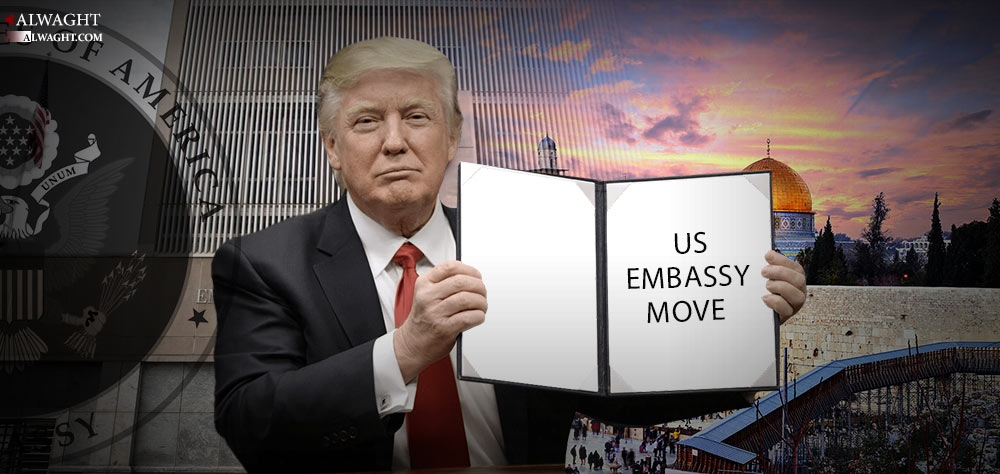Alwaght- Moving the US embassy to al-Quds (Jerusalem) on May 14 will be remembered in the history of the West Asia’s political developments as a turning point. Now the history of developments of the region’s most important case, the Palestinian cause, can be divided into before and after US embassy relocation.
The US President Donald Trump’s decision to move the embassy from Tel Aviv, apparently disregarding all of the UN resolutions on the occupied Palestinian territories, faced widespread international community opposition. The Eastern and Western opponents of the US unilateral move had a shared a central point: They all warned about the domestic, regional, and international consequences of the move. One ramification was the Israeli military massacring of over 60 Palestinian civilians and injuring 2,700 more who were protesting Washington's provocative move. Analysts believe that Trump administration’s measure will backfire.
US mediatory role ends, Arab-Israeli normalization stops
The first impact of this week’s developments in the Palestinian territories will be the death of the US role as a mediator in the peace talks between the Palestinians and the Israelis. Since the presidency of Bill Clinton in the early 1990s, Washington played a major mediating role to engage the Palestinian Fatah Movement and the Israelis in peace negotiations.
At that time, the two sides secretly conducted talks in Oslo, Norway. They then officially signed Oslo Agreement on 13 September, 1993. Yasser Arafat of the Palestinian Liberation Organization and the Israeli Prime Minister Yitzhak Rabin in the presence of the US President Bill Clinton signed the pact in Washington. As time passed, the US mediated more talks between the two sides.
But things changed when Trump assumed the power at the White House. He recognized al-Quds as the Israeli capital, and moved his country’s embassy to the originally Palestinian city. His actions drew serious reactions by the Palestinian officials. Mahmoud Abbas, the president of the Palestinian Authority, in his meeting with the Russian President Vladimir Putin on February 14 rejected more American mediation and said he favored diversified mediation body.
"We state that from now on we refuse to cooperate in any form with the U.S. in its status of a mediator, as we stand against its actions," Abbas told Putin at the start of talks in Moscow. He said that he hoped Russia could assume a greater role in Israeli-Palestinian peace talks, saying the United States "can no longer play a leading role."
When the US transferred its embassy to al-Quds this week, the fact that the Americans can no longer be mediators became known to all. Speaking at Chatham House institution in central London, the Turkish President Recep Tayyip Erdogan said Washington has created a problem and lost its mediator role in the region.
“The United States has chosen to be a part of the problem rather than the solution with its latest step and has lost its mediating role in the peace process”, he told the think tank.
Now there can be the talk of the US confusion and a loss of plan to persuade the Palestinians to go to the negotiating table with the Israelis as the Palestinian political groups as well as the international community, except for a small number of states that showed support to the US move under duress, rejected the decision.
Many analysts agree that the embassy relocation not only failed to serve the Israeli security and interests but also it destroyed the possibility of Arab-Israeli diplomatic normalization. Over the past decades, various US administrations supported Tel Aviv’s occupational agenda by desensitizing the Palestinian cause for the Muslim world whose first Qibla (direction that Muslims face towards when saying prayers) was al-Quds. But reactions to Trump’s move reflected Palestine weight in the eyes of the Muslims. It showed that a line should be drawn between the ordinary people and some of the dictatorships which are reliant on the West.
Palestinians more united, coordinated
Trump's uncalculated move also leads to unity among already divided Palestinian sides. The two leading movements Hamas and Fatah, for example, can now find the ground for setting aside disputes and working for their country’s good. Since the beginning of Palestinian Authority-Tel Aviv talks, Hamas and other factions expressed disapproval to the compromises. Their opposition sometimes developed to direct confrontation. In 2007, for example, Gaza became scene to armed clashes between Hamas and Fatah. The two engaged in reconciliatory dialogue in 2017 to help solve their disputes, but a degree of friction still exists between their leaders. Witnessing the biased, erratic, and treasonous nature of the US which colludes with some Arab regimes to end the possibility of forming an independent Palestinian state, the Palestinian groups with various views are expected to reunite in the face of the Israeli violation and occupation.
US faces deeper gaps with other global powers
Washington now is more than ever facing disagreement of its European allies like France, Germany, and Britain. Over the past few months, Washington relations with other powers were hit but discords over the Iran nuclear deal and the embassy move. Now, Russia, China, France, and Britain, four of which are Security Council’s permanent members, come against the US opening its embassy in al-Quds. At the May 15 United Nations Security Council’s meeting, all of the members, excluding the US, condemned the Israeli massacre of the Palestinians on the Gaza border on the embassy opening day. They prepared a strong resolution and called for investigation into the killings. But Washington envoy vetoed them.
With these in mind, contrary to what Trump and his advisors think, moving the embassy not only fails to help a settlement to the Palestinian issue and strengthen the Tel Aviv’s position but also it has formed a global front against the US.



























